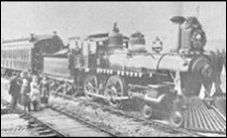On the banks of the Mighty Skagit,
In the haunts of the Siwash and slug.
Some time in the early eighties,
Rose a brisk little town, called Bug.
There are tales of the valor and prowess,
Of these knights of the saw and the ax,
Who made through the forest primeval,
The first irretraceable tracks,
There are tales of soul-stirring adventure;
Of bears that were bigger than barns;
Of salmon of whalelike proportions??
But I cannot spin all of these yarns.
And the little town grew so pretentious,
That it no longer fitted its name;
So out of regard for the cedars,
It finally Sedro became
Now, to the northeastward of Sedro,
Rose Woolley; and lo! there began,
A strife that was long and unhappy??
Raging fiercely, as clan against clan
But Woolley kept creeping southeastward,
And Sedro kept creeping northwest
Until it grew plain to all people
That peaceable union was best.
So they formally buried the hatchet
And all was henceforward serene;
For the two became Sedro-Woolley,
With only a hyphen between.
And I sing of a glorious future,
Well worthy the deeds of the past:
Here's 3 cheers for our own Sedro-Woolley,
Long may its prosperity last!
I've wandered all over the country,
Prospecting and digging for gold-
I've tunneled, hydraulicked and cradled
,
And I had been frequently sold-
Chorus
And I had been frequently sold,
And I had been frequently sold
I've tunneled, hydraulicked and cradled,
And I had been frequently sold.
For one who gained riches by mining,
Perceiving that hundreds grew poor
I made up my mind to try farming,
The only pursuit that was sure-
Chorus
The only pursuit that was sure,
So rolling my grub in my blanket,
I left all my tools on the ground
And started next morning to shank it
For a country they call Puget Sound.
Arriving flat broke in mid-winter,
I found it enveloped in fog,
And covered all over with timber
Thick as hair on the back of a dog.
|
As I looked on the prospect so gloomy
The tears trickled over my face
For I felt that my travels had brought me
To the edge of the jumping-off place.
I took up a claim in the forest
And sat myself down to hard boil
For two years I chopped and I labored,
But I never got down to the soil.
I tried to get out of the country,
But poverty forced me to stay:
Until I became an old settler,
Then nothing could drive me away.
And now that I'm used to the climate,
I think that if man ever found
A spot to live easy and happy,
That place is on Puget Sound.
No longer the slave of ambition,
I laugh at the world and its shams,
As I think of my pleasant condition
Surrounded by acres of clams.
|
Please sign our guestbook so our readers will know where you found out about us, or share something you know about the Skagit River or your memories or those of your family. Share your reactions or suggestions or comment on our Journal. Thank you for taking time out of your busy day to visit our site.
|
Sign Our Guestbook

View Our Guestbook
|
Remember, we welcome correction and criticism. Please click on the email slot at the right to report any problems with these pages or to suggest ideas for future stories. This is a completely free site. We fund it by providing an online magazine for paid subscribers. If you are not already a subscriber and you would like to help support our considerable research costs, you can subscribe for just $20.00 per year. As a paid subscriber, you will receive eight yearly issues plus many rare treats between times, including scans of photos and documents that illustrate local history, before they are shared with anyone else. You can go here for Subscription details and you can read the preview edition to see examples of our in-depth research. You may also order gift subscriptions for friends, family or clients who are interested in local history or students or military people who are away from home. Or you can email us for more details. Do you have scanned photos to share? Or you can mail us copies. See addresses to right.
|
Email us at: journal@stumpranchonline.com

Mail copies/documents to street address: Skagit River Journal, 810 Central Ave., Sedro-Woolley, WA, 98284.
|

 810 Central Ave., Sedro-Woolley, Washington, 98284
810 Central Ave., Sedro-Woolley, Washington, 98284